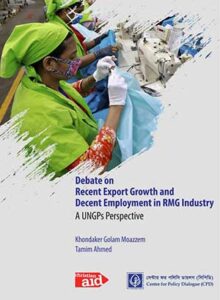
As Bangladesh charts out its recovery path from COVID-19, the country’s readymade garments (RMG) industry has been experiencing an unprecedented export growth since the last quarter of 2021. In view of this increase in export, the study aims to understand the impact of this higher export growth on business and human rights practices in the RMG sector based on the United Nations Guiding Principles on Business and Human Rights (UNGPs) framework. Findings of the study are mainly based on a primary survey conducted on RMG management and workers. The study findings show that a number of decent employment related indicators, particularly related to business human rights, have deteriorated to various extents during this high export growth period. These include deterioration of timely wage payment, increase in forced work, workplace harassment, and increase in child labour and juvenile workers. These deteriorations are observed both in contracted and sub-contracting factories to various extents. The role of government agencies and brands/buyers in monitoring business human rights practices are also observed to be below par in this period. Although the rise in export orders led to a subsequent rise in workers’ earnings, thanks to increased work hours and workdays, workers have not been benefitted much from this since their monthly expenditure have increased parallelly during this high export growth period. The study recommends that government agencies should strengthen the understanding and practices of business and human rights among enterprises and workers in accordance with UNGPs. Given the increase in household expenditure, the government may consider revising the existing minimum wage set for garment workers. Brands need to be more proactive in promoting business human rights in garment factories during any such high export growth period.


